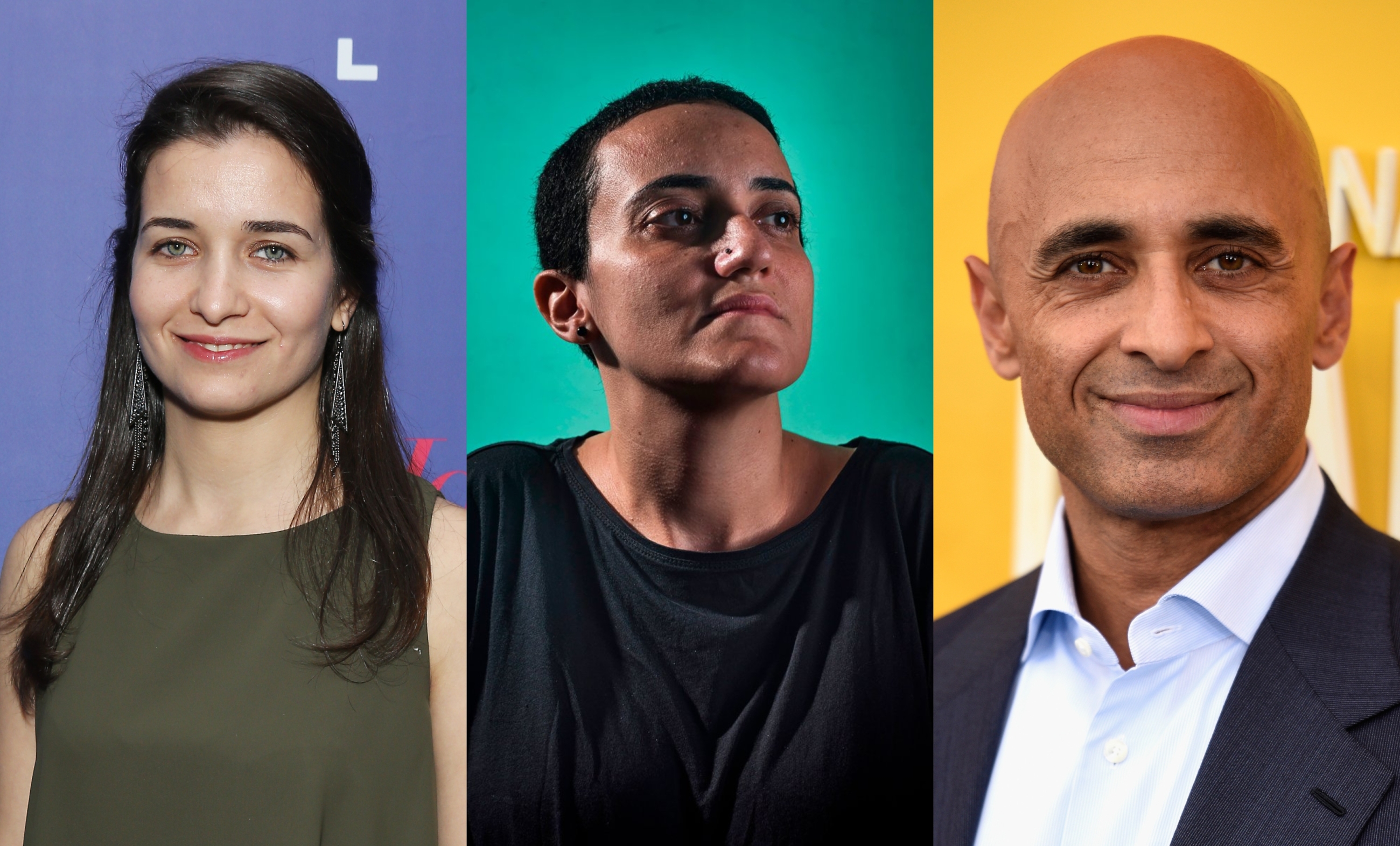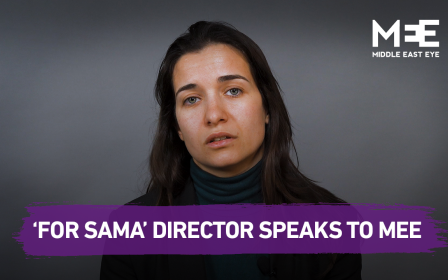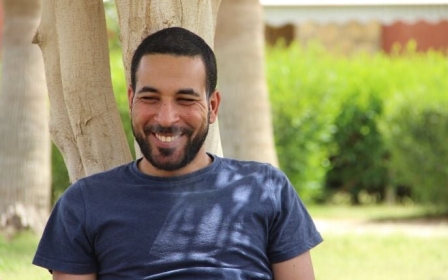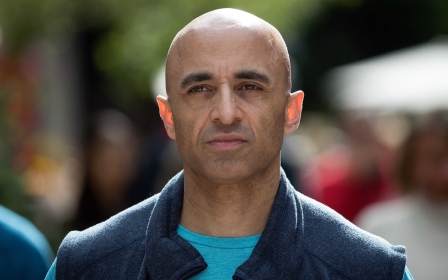TIME top 100: Waad al-Kateab, Lina Attalah and Yousef al-Otaiba make annual 'most influential' list

Syrian filmmaker Waad al-Kateab, Egyptian journalist Lina Attalah, Syrian military defector "Caesar", and the United Arab Emirates ambassador to Washington Yousef al-Otaiba have been named in TIME magazine's 100 most influential people of 2020.
The annual list, which has been compiled since 1999, was published on Tuesday evening and featured figures across five categories: pioneers, artists, leaders, titans and icons.
This year's list - which includes the likes of Black Lives Matter founders Patrisse Cullors, Alicia Garza and Opal Tometi; 82-year-old Indian anti-Islamophobia protester Bilkis; and Uyghur rights advocate Nury Turkel - has been praised for its diversity and recognition of global activists.
Of those recognised from the Middle East and North Africa, Kateab was among this year's "pioneers", while Attalah achieved "icon" status, and Otaiba and Caesar were acknowledged as "leaders".
Waad al-Kateab, filmmaker
New MEE newsletter: Jerusalem Dispatch
Sign up to get the latest insights and analysis on Israel-Palestine, alongside Turkey Unpacked and other MEE newsletters
For Syrian filmmaker Kateab, the past 12 months have been filled with recognition and accolades.
Her film "For Sama", shot on a handheld camera across five years of uprising in the Syrian city of Aleppo, won four British Independent Film Awards, as well as the top documentary prize at the 2019 Cannes Film Festival.
The deeply personal film documents Kateab falling in love and marrying Hamza, and giving birth to their daughter Sama, all while death and destruction ravage her hometown.
Speaking to Middle East Eye last year, Kateab said she framed the film around her daughter, but the story it told was a wider one: "It's all linked around Sama. Sama not just as my daughter, but as all of the children in Syria."
In January, the film became one of the most recognised documentaries in British Academy of Film and Television Arts (BAFTA) history after it was nominated across four categories. It went on to win the award for best documentary.
"At one point, we discussed with Channel 4 News where we could bury the footage so if we did not survive, it would not be lost," Kateab told the BAFTA audience in a moving acceptance speech.
The Syrian war documentary was also nominated for an Oscar, and Kateab made headlines after she took to the Hollywood red carpet in a dress embroidered with the words from an Arabic poem: "We dared to dream and we will not regret dignity" - a central theme of the film.
British actor and rapper Riz Ahmed, who wrote the introduction for Kateab on TIME's top 100 list, said:
"She told a story whose heroes are ordinary people risking everything to live free from tyranny: doctors working under fire to save others, teachers educating children in underground classrooms as bombs rain down outside. A story of extreme brutality, but also of endless hope."
Referencing the message on Kateab's Oscars dress, Ahmed said he was "in awe of her refusal to give up that dream".
Lina Attalah, journalist
Just four months ago, Attalah was detained by police after interviewing the mother of an imprisoned activist in Egypt's Tora prison for the news website Mada Masr, the staff of which Cairo's government has subjected to a campaign of arrests, raids and bans.
She is the chief editor and founder of Mada Masr, often described as the "last bastion of free press" in Egypt, due to its reports and investigations critical of the government. The independent news site is blocked inside the country.
"As other news groups in Egypt self-censor, Mada Masr, under chief editor Lina Attalah, constantly makes the choice to do stories they know will bring 'good trouble' - and it has," wrote investigative journalist Maria Ressa, in her summary of Attalah for TIME.
Last November, plain-clothed security forces stormed Mada Masr's offices in Cairo and detained three senior journalists - after holding staff for hours inside the premises.
The security forces confiscated laptops and phones of staff members, asking some of them to unlock their devices.
"When you live like this, each day requires a temperature check and a mental calculation," said Ressa. "Which story do you tackle? How far can you go?
"You won't know you've gone too far until you do, like when Lina and her team were arrested, handcuffed together in the police truck. They held each other's hands as they mentally grappled with the impact on their lives. They reminded each other: 'We are here by choice.'"
Since coming to power in a military coup in 2013, Egypt President Abdel Fatah el-Sisi has fiercely suppressed dissenting voices. Tens of thousands of people have been arrested, many of them critics, writers, journalists, human rights defenders and peaceful protesters.
Attalah's recognition by TIME was praised on social media, with users commending her "courage" and "impeccable work".
Yousef al-Otaiba, diplomat
Timing may have played a crucial role in the recognition of Otaiba. The Emirati ambassador to the US made the list just weeks after the UAE normalised relations with Israel, in a deal brokered by US President Donald Trump.
"Yousef al-Otaiba has spent years cultivating key players over lavish dinners and major charity donations - piddling gestures for the super-rich Gulf state, but tradable currency in the US capital," TIME correspondent Vivienne Walt wrote in her endorsement of the diplomat.
Otaiba, who has been the ambassador to Washington since 2008, is no stranger to controversy.
Two years ago, Middle East Eye revealed that Trump's closest confidantes were willing to share key inside information with Otaiba, and had offered the diplomat a meeting with Trump while he was still a presidential candidate.
In recognising Otaiba's work, TIME's summary did not shy away from the controversial elements of his influence.
"Since 2016, al-Otaiba has helped the Emirates' ally, Saudi Crown Prince Mohammed bin Salman, build close ties with the Trump administration, despite the Saudis' abysmal human-rights record," Walt said.
"He has successfully urged US support for the Gulf allies' war in Yemen, which has left over 100,000 dead and triggered a famine that will kill thousands more."
In a letter written in June, Otaiba warned Israel against its planned annexation of parts of the occupied West Bank, but went on to describe Israel as "an opportunity, not an enemy".
As part of the normalisation agreement with the UAE, Israel initially said it had agreed to suspend the annexation, however, Prime Minister Benjamin Netanyahu later said he remained committed to it.
Caesar, whistleblower
Also in this year’s list is “Caesar”, the codename of a Syrian military defector who smuggled over 50,000 photographs out of Syria which showed the torture and starvation faced by thousands who died in President Bashar al-Assad’s prisons.
The pictures showed the bodies of sometimes naked, brutally mutilated detainees, who had been held from 2011 as a result of their participation in anti-government protests.
“His extraordinary courage stemmed ultimately from his integrity and his belief in the power of photography as evidence. Caesar’s photographs are the most concrete proof of crimes against humanity by the Assad regime to date,” Pulitzer prize-winning journalist Lynsey Addario wrote for TIME.
“Caesar’s selfless courage helped the international community take a much needed step toward holding the Assad regime accountable for killing its own people with impunity,” she said.
Named after the defector, US Congress enacted the Caesar Syria Civilian Protection Act in June - a sweeping set of sanctions against any country, individual or entity that provides support to the Syrian government.
The policy has been criticised by some observers who warned that it could devastate the lives of ordinary Syrians attempting to rebuild their lives after nine years of civil war.
Middle East Eye delivers independent and unrivalled coverage and analysis of the Middle East, North Africa and beyond. To learn more about republishing this content and the associated fees, please fill out this form. More about MEE can be found here.






